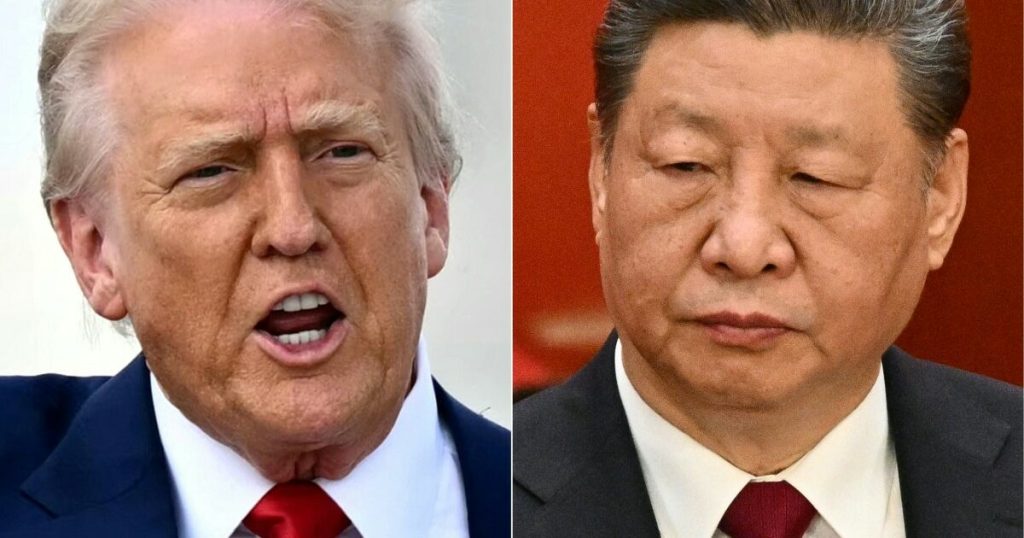The Trump-Xi Call: A Complex Interplay of TikTok, Trade, and Geopolitics
The Friday phone call between former US President Donald Trump and Chinese President Xi Jinping represented a critical juncture in the intricate relationship between the world’s two largest economies. The conversation, anticipated to address the fate of the popular video-sharing app TikTok and ongoing trade disputes, unfolded against a backdrop of escalating global tensions and shifting geopolitical alliances. Trump’s pre-call remarks hinted at a potential resolution to both issues, highlighting a seemingly positive rapport with Xi, despite the underlying complexities of their bilateral engagement. This call, their second since Trump left office, followed an earlier exchange where reciprocal invitations for state visits were extended, although no concrete travel plans materialized. The call carried significant weight, as it offered an opportunity to reshape the trajectory of US-China relations, particularly concerning trade and technology.
TikTok’s Destiny in the Balance
A major focal point of the call was the future of TikTok in the United States. Trump had repeatedly threatened to ban the app under national security concerns, pressuring TikTok’s Chinese parent company, ByteDance, to divest its US operations. The potential sale had become a protracted saga, with various American companies, including Oracle, Silver Lake, and Andreessen Horowitz, rumored to be involved in a potential consortium to acquire TikTok’s US business. Trump’s public statements suggested a preference for an all-American ownership structure, potentially involving “very rich people and companies.” Interestingly, Trump attributed TikTok’s popularity to boosting his own appeal among younger voters and even claimed it contributed to his hypothetical 2024 election victory. This assertion underscores the app’s significant cultural influence and its potential role in shaping political discourse.
Navigating the Thorny Terrain of Trade
Beyond TikTok, the call aimed to address the persistent trade tensions between the US and China. Earlier in the year, both nations engaged in a tit-for-tat tariff war, disrupting global supply chains and impacting businesses worldwide. A temporary truce was reached, with reduced tariffs set to expire in November. The phone call provided an opportunity to renegotiate these terms and potentially forge a more stable trade relationship. The existing agreement involved the US imposing 30% duties on Chinese imports, while China reciprocated with a 10% tariff on US goods. Finding a mutually acceptable compromise on tariffs was crucial to mitigating the economic fallout of the trade dispute and preventing further escalation of tensions.
Geopolitical Maneuvering and Strategic Partnerships
The Trump-Xi conversation took place within a broader geopolitical context marked by shifting alliances and power dynamics. Xi had recently hosted a summit with the leaders of Russia and India, further cementing China’s relationships with these key players. Notably, North Korean leader Kim Jong Un was also invited to observe a military parade in Beijing, signaling a strengthening of ties between China and North Korea. Trump’s public message to Xi, referencing Putin and Kim, and expressing concern about their “conspiring” against the US, highlighted the underlying tensions and mistrust that permeated the US-China relationship. This message, delivered via Trump’s Truth Social platform, further complicated the already delicate diplomatic landscape.
Sanctions and the Ukraine Conflict
The issue of sanctions further complicated the US-China dynamic. Trump criticized India for its oil purchases from Russia and called for sanctions against China for similar actions. He suggested that Chinese sanctions could potentially bring an end to the war in Ukraine. However, the US itself had refrained from imposing sanctions on China for its Russian oil purchases, highlighting a degree of inconsistency in Trump’s stance. This complex web of sanctions and geopolitical maneuvering added another layer of complexity to the Trump-Xi conversation.
The Pursuit of Leverage and a Path Forward
Both Trump and Xi likely entered the call seeking to maximize their leverage and secure favorable outcomes on the discussed issues. The outcome of the call carried significant implications for the future of US-China relations, the global economy, and the geopolitical landscape. While the details of the conversation remained largely private, the public pronouncements and surrounding circumstances suggested a complex interplay of cooperation and competition. The call represented a crucial step in navigating the turbulent waters of US-China relations, with the potential to either exacerbate existing tensions or pave the way for a more constructive engagement. The challenge for both leaders was to find common ground amidst their divergent interests and navigate the complex geopolitical landscape to achieve a mutually beneficial outcome.


